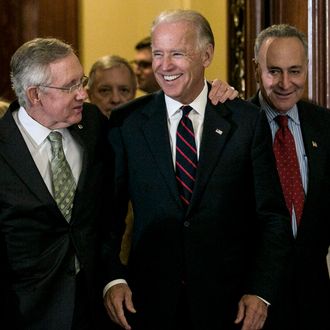
The Senate had an exciting day on Wednesday, with votes on whether the Bush tax cuts should be extended across the board or only on earnings below $250,000 a year. Vice-President Biden was on hand to cast a tie-breaking vote, but it wasn’t necessary. The Senate rejected the GOP’s plan to extend all cuts, and passed the Democrats’ plan to keep middle class tax cuts, 51-48. None of this actually affects Americans’ taxes, since the votes were mainly about political maneuvering.
The House won’t be taking up the bill, but will instead vote on its own version next week (some pointed out that the bill couldn’t move forward either way, since the Constitution says tax legislation must originate in the House). As Mitch McConnell explained, the vote was about “showing the people who sent us here where we stand.” Now Republicans can accuse Democrats of raising taxes when the economy is still recovering, and Democrats can argue that Republicans are hurting the middle class to protect the rich from paying more taxes. It’s unlikely that the issue will be resolved before the election, but Congress has reassured the American people that it’s still committed to not actually accomplishing things.






























